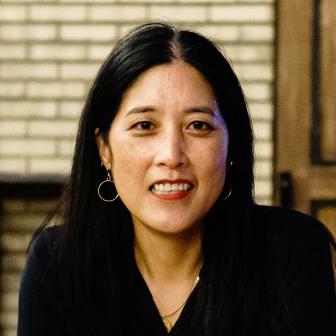Victoria Chang
Red Bird, 1964
Rode Vogel, 1964
Ik heb maar eens in mijn leven een dode vogel van dichtbij gezien. Hij was niet rood maar blauw. Ik gaf hem de naam Geluk voor ik hem begroef. Mijn kind raapte wat takjes zodat we een kruis konden maken. We groeven een gat en gooiden de vogel erin, met wat bloemen die we hadden geplukt. We raakten de vogel niet met blote handen aan, voor het geval de dood besmettelijk was. Toen ik het kruis in de grond stak, bedacht ik dat Nietzsche het mis had. Geluk is niet het gevoel dat macht groeit. Het meer is geen markt. De korte potloodstreepjes op het schilderij zijn geen meethulpje. Toen ik de dode vogel van dichtbij zag wilde ik hem alleen maar bedekken, niet zijn gevoelens verkopen. Ik bevind me ver van hem vandaan, in een ander huis, maar ik heb de gevoelens van de vogel nog in een doosje. Iedere lente weer kan ik de babyvogels onder het dak maar niet ontdekken, die, als ze honger hebben, klinken als de dood. Al die maanden heb ik gedacht dat het vogels waren, maar uiteindelijk bleken het ratten. En de gevoelens in het doosje waren van mij.
Red Bird, 1964
I’ve only seen a dead bird up close once. It wasn’t red but blue. I named it Happiness before I buried it. My child found a few sticks so we could make a cross. We dug a hole and dropped the bird in, along with a few flowers we plucked. We didn’t touch the bird with our bare hands, in case death was contagious. When I put the cross into the ground, I felt that Nietzsche was wrong. Happiness isn’t the feeling that power increases. The lake isn’t a marketplace. The small pencil marks on the painting aren’t measuring anything. Seeing the dead bird up close only made me want to cover it, not sell its feelings. I am far away from it, in another house, but I still have the bird’s feelings in a small box. Each spring, I can’t see the baby birds in the rafters that, when hungry, sound like death. All these months, I thought they were birds, but it turns out they were really rats. And the feelings in the small box were my own.
From: With My Back to the World
Publisher: Farrar, Straus & Giroux, New York City
Red Bird, 1964
I’ve only seen a dead bird up close once. It wasn’t red but blue. I named it Happiness before I buried it. My child found a few sticks so we could make a cross. We dug a hole and dropped the bird in, along with a few flowers we plucked. We didn’t touch the bird with our bare hands, in case death was contagious. When I put the cross into the ground, I felt that Nietzsche was wrong. Happiness isn’t the feeling that power increases. The lake isn’t a marketplace. The small pencil marks on the painting aren’t measuring anything. Seeing the dead bird up close only made me want to cover it, not sell its feelings. I am far away from it, in another house, but I still have the bird’s feelings in a small box. Each spring, I can’t see the baby birds in the rafters that, when hungry, sound like death. All these months, I thought they were birds, but it turns out they were really rats. And the feelings in the small box were my own.
Red Bird, 1964
Sponsors
















